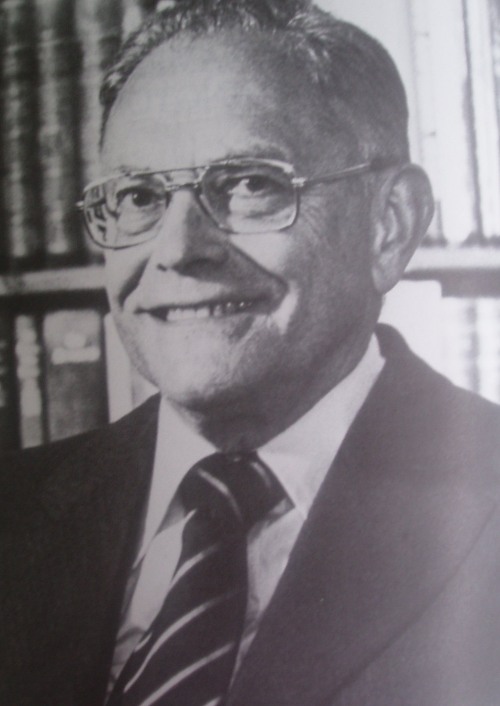
During the 1950s to 1970s an occasional newsletter hosted by the Washington State Historical Society kept track of “old news.” Edited by an armchair historian named Robert Hitchman, those stapled sheets offered names, dates, and origins of “Pacific Northwest Americana,” plus occasional whimsical and folksy observations by the editor.
Born in Denver, Hitchman attended the University of Washington in the 1920s, where he became a student and friend of Professor Edmond S. Meany. Meany’s reputation as an expert on Pacific Northwest history affected Hitchman in many ways. Washington state place names became one obsession. Hitchman’s version of place names stretched beyond Meany’s 1923 Origin of Washington Geographic Names and would be published posthumously.
Other Hitchman influences included a wide correspondence with authors, historians, fellow students, and book dealers. He became, in effect, a pre-television advocate for regional history in all forms.
Hitchman’s income derived from selling insurance. That led to another of his history fetishes — collecting records of unusual insurance cases. His professional efforts were rewarded by his becoming president and chair of the board of Unigard Mutual Insurance Company.
Hitchman’s newsletter, “Sighted From the Crow’s-Nest,” roamed the gamut of historical flotsam. When citing a publication, Hitchman would often ponder and dote on the author’s style and his/her historical record. Those personal notes caused the Washington State Historical Society to paste a disclaimer on the newsletter: “All comments and appraisals are those of the compiler; therefore, the Society assumes no responsibility for statements of fact or opinion by Mr. Hitchman.”
Hitchman likely used the term “crows-nest” in its classical sense, i.e. a platform near the top of a ship’s mast. His cherished overview was a 360-degree sighting of whatever emerged from the presses holding content about the Pacific Northwest. And like a perched crow, he intended to see and describe whatever caught his sharp eye.
For example, Irish-Canadian painter Paul Kane, who traveled and sketched First Nation and Metis residents throughout the Pacific Northwest in 1846-1848, was a particular favorite of Hitchman, University of Texas Press, 1971, prompted this comment by Hitchman: “This volume alone is enough to make the year 1971 a memorable one for book collectors, for it is all that a book should be: an excellent subject, scholarly presentation, handsome design, clean and exemplary printing, beautiful illustrations – and a great bargain withal (at $75).”
After reading Bibliography Of Captain James Cook, R.N., F.R.S., Circumnavigator (The Library of New South Wales, Sydney, Australia, 1970), Hitchman wrote: “It is a monumental compilation: an inspiration to competent and dedicated bibliographers and should put to shame those who are neither.” Hitchman then waded into five more Cook volumes, 1928 to the 1970s, noting that these efforts are “fun for youngsters and fun for adults.”
James G. Swan, surveyor, amateur anthropologist and amateur historian of the Olympic Peninsula, 1859-1861, after publishing his Almost Out Of The World, received this Hitchman rave: “Here is a book to read and re-read with relish!” Swan himself was described as “a perceptive man, intelligent and literate, one of the few in those days who understood the Indians.”
One oddity that caught Hitchman’s eye was Eighty Years Of Service: A History Of The Children’s Department: Seattle Public Library, by Linda Brass (1971). Hitchman’s description of the 63-page booklet added more history: “Some 63 years ago the Children’s Librarian organized a Boys’ Club which met at 7:30, ‘a time when newsboys and others who worked until 6 p.m. would be free to attend’ – in large part a crusade against nickel novels.”
Occasionally Hitchman found a classic, such as Jose Mariano Mozino’s Noticias De Nutka: An Account of Nootka Sound in 1792. Mozino was Spain’s leading scientist exploring the Pacific Northwest before Russian, British, and American sea captains sailed the West Coast — most in search of sea otters while others “discovered” and claimed land for their respective sovereigns.
Robert Hitchman wore several hats: president of the Washington State Historical Society; chair of the Pacific Northwest Group of Explorers Club; historian for Rotary Club of Seattle, district 503; member of the Bibliographic Society of America; president, the Seattle Foundation; member of the American Antiquarian Society. He and his wife Helen also founded The Robert and Helen Hitchman Charitable Trust, Seattle.
Robert died on 17 April, 1981, while attending an American Antiquarian Society meeting in Worcester, Massachusetts. The Crow’s-Nest newsletter, once issued “at irregular intervals as the spirit moves and as time permits” is out of print, except for issues held by the Seattle Public Library and the archives of the Washington State Historical Society in Tacoma.
Discover more from Post Alley
Subscribe to get the latest posts sent to your email.
